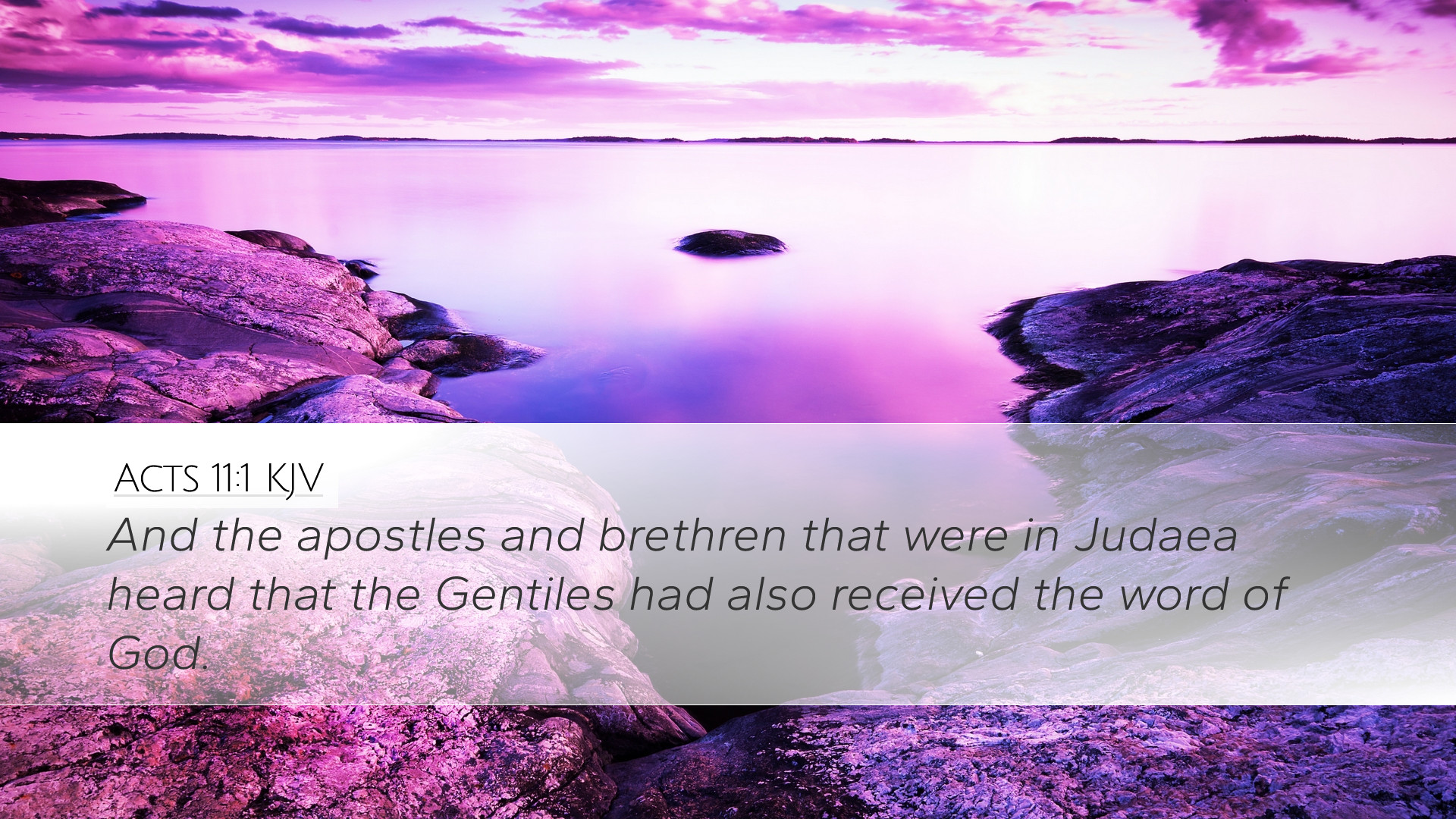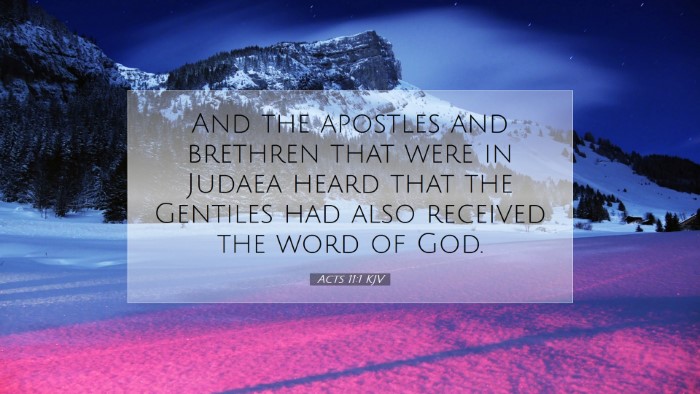Commentary on Acts 11:1
Acts 11:1 states: "Now the apostles and brethren who were in Judea heard that the Gentiles had also received the word of God." This verse marks a significant development in the early church, indicating the spread of the Gospel beyond Jewish boundaries, and it serves as a pivot point for understanding the dynamics of the early Christian community.
Contextual Background
In the preceding chapters, particularly Acts 10, we see the pivotal moment of Peter's vision and subsequently his visit to Cornelius, a Gentile centurion. This was a groundbreaking moment where the Gospel was first preached to non-Jews, highlighting a new phase in the missionary outreach of the church.
Reactions in Judea
The report of Gentile conversions raised eyebrows among the Jewish believers in Judea. The reference to "the apostles and brethren" indicates a collective concern among the foundational leaders and the wider community of faith regarding doctrinal purity and the implications of including Gentiles within the fold of God’s people.
Insights from Public Domain Commentaries
Matthew Henry's Commentary
Henry emphasizes that the success of the Gospel among the Gentiles signifies God's favor transcending national and ethnic barriers. He notes that the early church's reaction is significant; they were not merely pleased but rather perplexed and inclined to inquire about the details of this revolutionary event.
- Revelation of God's Plan: Henry posits that this event was part of God's overarching plan, showcasing His intention to include the Gentiles into salvation.
- Importance of Communication: The news of Gentile conversions reached the apostles, indicating the importance of sharing testimonies within the community.
Albert Barnes' Commentary
Barnes notes the importance of this verse in the context of the Acts narrative, framing it as a crucial turning point. He highlights a few key points:
- New Developments in the Church: The urgency in the report suggests that the church was at a junction, needing to assess its trajectory and mission.
- Criticism and Inquiry: Barnes underscores the critical stance among the believers in Judea, raising questions about the implications of sharing the Gospel with Gentiles.
Barnes also underlines that this incident reflects early signs of tension that would grow as the church expanded, focusing on the need for discernment amidst rapid growth.
Adam Clarke's Commentary
Clarke offers a more detailed exploration of the implications of Gentile conversion, suggesting that this is a fulfillment of the prophecies regarding the inclusion of the nations into the covenant community. He elaborates on the following themes:
- Progressive Revelation: Clarke points out that this event is part of the progressive revelation of God’s purpose in redemption, as seen throughout the Scriptures.
- Unity in Diversity: The acceptance of Gentiles into the church summarizes the theme of unity amidst diversity in the body of Christ.
Theological Reflections
This verse serves as a launching pad for several significant theological reflections essential for both contemporary believers and scholars:
- Inclusivity of the Gospel: Acts 11:1 affirms that salvation through Christ is for all people, breaking down barriers established by religion, culture, and ethnicity.
- Received the Word: The phrase "received the word of God" suggests an active engagement and response to God's message, emphasizing the necessity of faith in the process of salvation.
- Community Dynamics: The reactions of the apostles and brethren can be seen as a reflection of the natural human tendency to cling to familiar boundaries, which requires theological education and community discussion.
Practical Applications
Pastors and leaders can draw practical applications from this passage as they navigate the complexities of church growth and multicultural ministry:
- Encouragement of Diversity: Celebrate and integrate the diverse backgrounds of congregants as a reflection of the broad scope of God's grace.
- Facilitating Communication: Create spaces within church theology and practice to discuss and discern emerging trends in faith and inclusivity.
- Prophetic Voice: Utilize the truth of this scripture to challenge congregations to extend their reach beyond traditional boundaries.
Conclusion
Acts 11:1 provides a critical moment in the unfolding narrative of the early church and showcases a shift towards a more inclusive understanding of the covenant community. Through the insights derived from noted public domain commentaries, we see a deepened understanding of God's plan for humanity, the vital role of communication within the body of Christ, and the call for believers to embrace diversity as they live out their faith. This text not only serves to inform theologians and scholars but acts as a guiding principle for church leadership today as it navigates the complexities of a rapidly evolving cultural landscape.


